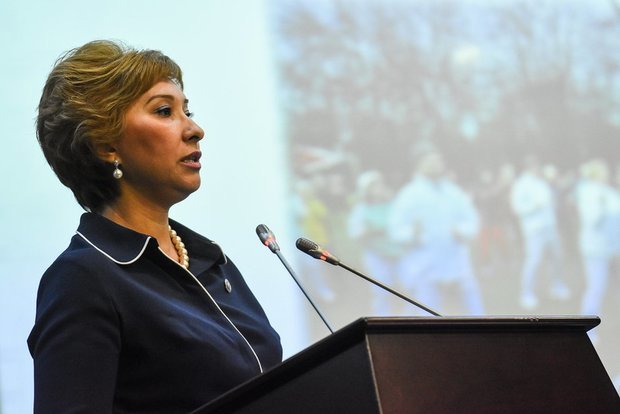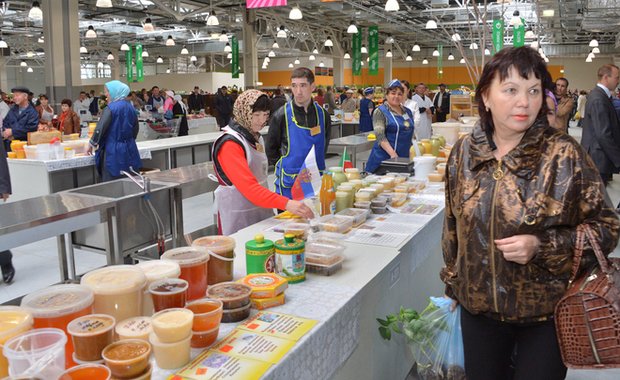Altogether: benefits for kids and cows to return people to backwoods
50,000 rubles will be paid for the first child 2,000 for a cow
A woman can not only stop a horse riding at a gallop and enter a burning hut but also resuscitate villages. From the point of view of local authorities, the fine sex of the Tatarstan backwoods is the only hope to cope with the demographic crisis. It was decided to bring the good life to the countryside, so that girls wouldn't go to a city in search of a better life. Benefits of up to 100,000 rubles for a kid and 4,000 for a cow will help this. The latter will relieve the beginning of the year that wasn't good due to reduced purchasing milk prices. Realnoe Vremya tells the details.
No women in the Tatarstan countryside
Tatarstan decided to take the countryside from the demographic pit. The research whose results were announced by Minister of Labour, Employment and Social Protection of Tatarstan Elmira Zaripova in the Cabinet of Ministers' briefing on 13 February suggests that girls massively go to cities without creating a family and building a career in the countryside.
''The lifestyle in the countryside is more laborious, while the youth has a choice of going to a city where life is more interesting. This is why the outflow of the rural population goes on,'' Minister of Agriculture of Tatarstan Marat Akhmetov complained.
The number of women of childbearing age in the countryside reduced by three thousand people. This is why natality is falling. If there was a growth in 1999 – plus 1,193 people, there was only a decline in 2016 – minus 1,289 people. In addition, the total number of the population in the republic grows thanks to cities.
''The quantity of kids who were born in the countryside to women aged 20-40, it was five times less than in cities in 2016. The countryside gave us a 17% increase in the population in 2016 and 30% in 1999,'' said Elmira Zaripova.
The population's decline is detected in 37 districts of Tatarstan. The bind is in Tetyushi, Kaybitsy, Rybnaya Sloboda Districts. A natural growth is seen only in six districts and two municipalities.

To bear: 50,000 for first kid and 100,000 for third
A special regional programme was created in the countryside to boost natality. But not every woman can become its participant and get from 50 to 100,000 rubles. Firstly, one needs to prove their loyalty to the countryside – to live there at least for three years. It will be checked by a stamp in the passport.
Secondly, to bear, of course. But there is an age limit – the first kid must be born before his mother is 25. The government will make a one-time payment of 50,000 rubles for it.
Tatarstan set a task to increase the number of the population as much as possible and within a short time. This is why the 100,000 rubles can be received only for the third kid, who can't be born without the second one. But there is a nuance here – one must become a mother of a large family before 29.
So the republic hopes to solve the problem of postponed childbearing.
''If in the 1990s an average age of women who gave birth to the first kid was 25-26 in cities and the countryside, now it's 29 years. When will she bear the second and the third kid then?'' Zaripova asked.
The answer is that she can not to give birth at all, considering health isn't becoming better as time goes by.

51 families got Putin's money for first kid and mortgage for third
The effectiveness of this measure can be evaluated not earlier than in a year, that's to say, if all women start to get pregnant right now. But after analysing the existing numbers about the quantity of babies in the countryside (2,020 women under 25 bore their first kid and 397 women had the third kid before 29 years in 2017), the Ministry of Labour, Employment and Social Protection hoped the digits wouldn't be less. However, here there is no data about how many years young mothers lived in the countryside. This is why the results can be unexpected.
Nobody has so far asked the regional money. Elmira Zaripova reminded that one can do it during the next six months from the kid's birthday. But there are people who were first to ask federal money of 8,490 rubles a month (the families whose income is less than 13,713 rubles per capita can get it). 51 people asked the benefit in Tatarstan, the first payment was in Baltasi district. Moreover, it's been the first in the country. And the first mortgage with the subsidised interest rate for families with a third kid was granted in Naberezhnye Chelny.
Cheapened milk to be compensated in February
It will be difficult to increase natality by means of benefits only, jobs are also needed. Here the minister of agriculture and food of Tatarstan couldn't gladden with the news – measures supporting owners of farms and household plots didn't rise. The exception is that it was decided to pay the benefits for household plots at 360 million rubles not in August but February due to a sudden fall in purchasing prices for milk and distribute in favour of the owners who have more livestock.
''Those who have one cow don't produce many products, they just cover their own needs. And this is why we decided to allocate not 3 but 4,000 rubles per cow. Those who have three or more cows have suffered from the reduction of purchasing prices. For this reason, it was decided to give them 4,000 rubles. It will help to soften the situation and affect the mood of those who deal with cows,'' Akhmetov said.

According to the minister, an immeasurable delivery of milk powder led to the reduction of purchasing prices. So the natural feedstock wasn't in demand. It overlapped with the situation in the local market.
''Taking into account that enterprises went through bankruptcy procedures and we found investors who upped and started to work in summer, we had to continue to export 1,000 tonnes of milk outside the republic. And the enterprises we had been working with for many years started to say they had milk powder for processing, they weren't going to buy ours. Consequently, prices started to fall. Modernisation takes time. We have an investment programme in the Kazan factory for 1 billion rubles of income with 1,000 tonnes of processing. They augment milk reception day after day – they started with 40 tonnes, now they're processing 200 tonnes, in summer they will reach 400 tonnes and 1,000 tonnes in 2019. There are projects in Mamadysh, Naberezhnye Chelny factories, Bugulma, Chistopol. The Zelenodolsk factory works full steam,'' said Marat Akhmetov.
8,2 billion to build in the countryside
''Family Farmer'' and ''Young Farmer'' programme work to help household plots. It's planned to increase the quantity of their participants 1,5 times and expend a total of 750 million rubles in 2018. 17 agricultural parks will be built to sell produce – like in Kazan whose effectiveness, by the way, was questioned by Akhmetov.
''Instead of one agro park in Kazan, we could have built three in different districts. But we have what we have,'' said Akhmetov.
The first project will be fulfilled in Zainsk, the others – in other cities of Tatarstan, including three in Kazan.

Rafar Shakirov, first deputy director of the Main Investment and Construction Administration of Tatarstan, told about the development of social infrastructure. He says that 83,9 billion rubles went through his administration from 2011 to 2017, of which 27,3 billion were aimed to develop the countryside.
In 2018, in general, Tatarstan plans to spend 14,5 billion to build and repair 1,409 facilities, of which 1,040 facilities for 8,2 billion are in the countryside.